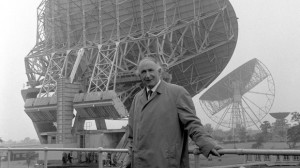Pioneering English radio astronomer Bernard Lovell died on August 6, just short of his 99th birthday. Lovell is survived by four of five children, 14 grandchildren and 14 great-grandchildren.
Reflecting on Lovell’s death, Lord Martin Rees, Astronomer Royal, said: “Bernard Lovell ranks as one of the great visionary leaders of science. He had the boldness and self-confidence to conceive a giant radio telescope, and the persistence to see it through to completion, despite the risk of bankruptcy. What is even more remarkable is that, more than 50 years later, this instrument (after several upgrades) is still doing ‘frontier’ science.”
Lovell was a physicist studying cosmic rays when World World II broke out. As part of the war effort, he led a team developing airborne radar technology for tracking enemy fighters. After the war, he tried to use the same technology to watch cosmic rays. To avoid ambient electrical interference, he decamped with his equipment to a garden patch of the University of Manchester. There, he ultimately established Jodrell Bank Observatory and built the then-biggest steerable radio telescope, now the third biggest, in existence. His remarkable construction nearly failed for want of funds until Sputnik burst on the scene and the 76m telescope became part of a strategy for monitoring the Soviet arsenal. The 55 year old telescope is now part of European very Long Baseline Interferometry Network. Lovell was knighted for his contributions in 1961 and the telescope was named after him in 1987. Lovell served as director of Jodrell Observatory up until 1980. Until a recent illness, Lovell still went to work at his observatory every day.
Lovell was an avid pianist and cricket player, but he is perhaps best described by long time colleague University of Manchester Professor Brian Cox: the man who practically invented the subject of radioastronomy was “an inquisitive scientist all the way.”
Below, watch a 2009 BBC interview with Lovell discussing the early days of his telescope:


















































































































![A trajectory analysis that used a computational fluid dynamics approach to determine the likely position and velocity histories of the foam (Credits: NASA Ref [1] p61).](http://www.spacesafetymagazine.com/wp-content/uploads/2014/05/fluid-dynamics-trajectory-analysis-50x50.jpg)



Leave a Reply